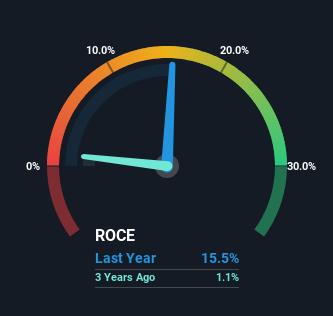
There are a few key trends to look for if we want to identify the next multi-bagger. Firstly, we'd want to identify a growing return on capital employed (ROCE) and then alongside that, an ever-increasing base of capital employed. Ultimately, this demonstrates that it's a business that is reinvesting profits at increasing rates of return. So, when we ran our eye over Israel's (TLV:ILCO) trend of ROCE, we liked what we saw.
Return On Capital Employed (ROCE): What Is It?
For those who don't know, ROCE is a measure of a company's yearly pre-tax profit (its return), relative to the capital employed in the business. To calculate this metric for Israel, this is the formula:
Return on Capital Employed = Earnings Before Interest and Tax (EBIT) ÷ (Total Assets - Current Liabilities)
0.16 = US$1.6b ÷ (US$13b - US$2.6b) (Based on the trailing twelve months to September 2023).
Therefore, Israel has an ROCE of 16%. In absolute terms, that's a satisfactory return, but compared to the Chemicals industry average of 12% it's much better.
See our latest analysis for Israel

Historical performance is a great place to start when researching a stock so above you can see the gauge for Israel's ROCE against it's prior returns. If you're interested in investigating Israel's past further, check out this free graph of past earnings, revenue and cash flow.
How Are Returns Trending?
The trend of ROCE doesn't stand out much, but returns on a whole are decent. The company has employed 31% more capital in the last five years, and the returns on that capital have remained stable at 16%. 16% is a pretty standard return, and it provides some comfort knowing that Israel has consistently earned this amount. Stable returns in this ballpark can be unexciting, but if they can be maintained over the long run, they often provide nice rewards to shareholders.
Our Take On Israel's ROCE
The main thing to remember is that Israel has proven its ability to continually reinvest at respectable rates of return. However, despite the favorable fundamentals, the stock has fallen 13% over the last five years, so there might be an opportunity here for astute investors. For that reason, savvy investors might want to look further into this company in case it's a prime investment.
If you'd like to know about the risks facing Israel, we've discovered 2 warning signs that you should be aware of.
For those who like to invest in solid companies, check out this free list of companies with solid balance sheets and high returns on equity.
New: AI Stock Screener & Alerts
Our new AI Stock Screener scans the market every day to uncover opportunities.
• Dividend Powerhouses (3%+ Yield)
• Undervalued Small Caps with Insider Buying
• High growth Tech and AI Companies
Or build your own from over 50 metrics.
Have feedback on this article? Concerned about the content? Get in touch with us directly. Alternatively, email editorial-team (at) simplywallst.com.
This article by Simply Wall St is general in nature. We provide commentary based on historical data and analyst forecasts only using an unbiased methodology and our articles are not intended to be financial advice. It does not constitute a recommendation to buy or sell any stock, and does not take account of your objectives, or your financial situation. We aim to bring you long-term focused analysis driven by fundamental data. Note that our analysis may not factor in the latest price-sensitive company announcements or qualitative material. Simply Wall St has no position in any stocks mentioned.
About TASE:ILCO
Israel
Operates in the specialty minerals and chemical businesses in Europe, Asia, South America, North America, and internationally.
Flawless balance sheet and good value.
Market Insights
Community Narratives



